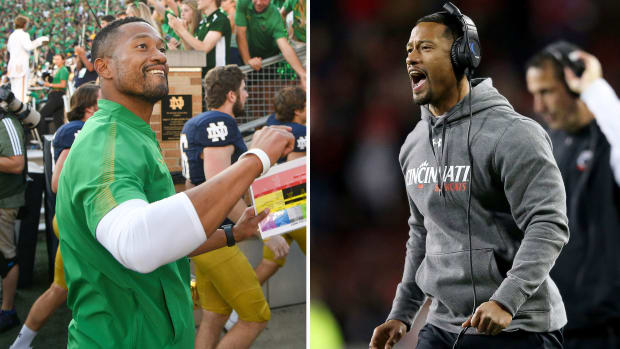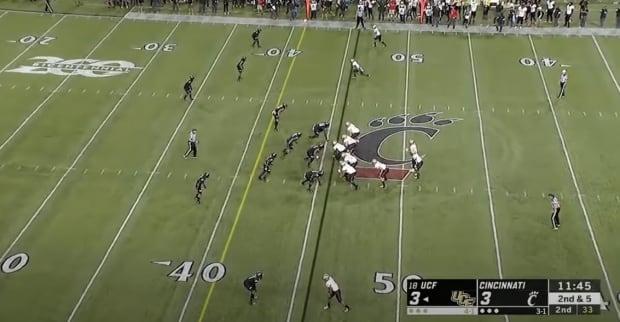What happens when your DC leaves for another job … at a school on your schedule that fall? The Bearcats find out this week.
The weekly ritual of football game planning is hard enough—and then, sometimes, circumstances add a fourth layer to the three-dimensional chess match of scheming for an opponent.
What happens when you don’t just know the opposing coordinator, but you know him? You know how he coaches and how he thinks. You know his situational proclivities and the rhythms of his play-calling. And you know that he knows the same things about you. That is the challenge for Cincinnati’s coaching staff as it prepares to face
Notre Dame on Saturday, because Irish defensive coordinator Marcus Freeman spent four years as an architect of the Bearcats’ Blackcat defense.“You can know too much,” Cincy coach Luke Fickell says. “Then, when you know too much you try to stop everything, and it makes it difficult because there’s only so much that you can do and only so much that you can expect kids to understand. Sometimes knowing too much is not a good thing.”
If you need to get all the way to a sixth degree of separation to connect any two major college football coaches, you probably aren’t looking in the right place. Consider Fickell and Freeman’s overlaps. Fickell, a standout defensive lineman at Ohio State in the mid-1990s, was a graduate assistant with the Buckeyes in ’99 before leaving to coach at Akron for two years. In 2001, when the Zips played the Buckeyes, he knew OSU’s personnel but not the coaching staff, as it was Jim Tressel’s first year at the helm. Fickell would soon become acquainted when he went to work for Tressel and Ohio State in various roles from ’02 to ’16 (Tressel’s nephew Mike is the current Cincinnati defensive coordinator, replacing Freeman).
As linebackers coach in Columbus, Fickell coached Freeman directly as the Buckeyes made it to back-to-back national title games in the 2006 and ’07 seasons. Freeman went on to the NFL, where he had to medically retire, and then surprised his old coach in ’10 by calling to ask to join the Buckeyes’ coaching staff as a graduate assistant.

Matt Cashore/USA TODAY Sports; Kareem Elgazzar/The Enquirer/USA TODAY Network
“I don’t think this is what you really want to do,” Fickell recalls telling Freeman. He said Freeman was so smart and not the typical “meathead that only wants to play football and coach football.”
Fickell tried to send him under Ohio State AD Gene Smith’s wing and down the administrative route. But when a different football GA was unable to join the staff, as Fickell tells it, Freeman came on in the end and was a graduate assistant for a year before beginning his assistant career in full with stints at Kent State and Purdue under Darrell Hazell (a former Ohio State assistant coach).
In 2016 the Purdue coaches were fired and Fickell was hired at Cincinnati. Freeman and another assistant were among the first calls Fickell made to put a staff together. Freeman temporarily moved into Fickell’s Columbus home to help put plans in place for the full move to the Queen City. Fickell was working two jobs at the time, getting his Buckeyes defense ready to play a College Football Playoff game by day and building a plan for the Bearcats with roommates Freeman and running backs coach Doug Phillips by night.
Any familiarity with Ohio State didn’t help much when it faced the playoff-bound Buckeyes early in the 2019 season, but a few weeks later, the chief innovation of Freeman’s time in Cincinnati got a full debut against UCF: a new base defense to take space away from increasingly spread-out offenses in the AAC.

Freeman and the defensive staff came into that season expecting to stick with the base four-down linemen D that powered them to 11 wins in 2018, but days before the ’19 season started, one of the team’s starting safeties was lost for the year with a knee injury. His replacement’s strong suit wasn’t playing down in the box manned up against a slot receiver. So the Bearcats tinkered with substituting a defensive lineman off the field and adding a fifth defensive back, dubbed the “dollar” safety. The move took some getting used to for Fickell, a four-down guy at heart, but it paid dividends and the Knights scored only 24 points (their second-lowest in any game from ’17 to ’20) against Cincy’s Dollar. The Bearcats went on to the AAC title game.
Notre Dame declined to make Freeman available for this story, but Freeman did speak to Chris Vasseur of the Make Defense Great Again podcast in March about that Cincinnati defense.
“The whole premise of it was that we wanted to put people in space,” he said on the podcast. “When you play the UCFs, you play the Tulsas, you play the Houstons now, some of those spread teams that make you defend 53 ⅓ blades of grass [the width of a football field] … a lot of these RPO teams, a lot of these Air Raid teams are looking for space.”
The defense has some similarities to the tite front popularized by Iowa State, albeit with different principles built in regarding use of man coverage and how players fit the run. That ISU defense is coordinated by Jon Heacock, who was Freeman’s defensive coordinator at Kent State. Heacock’s brother, Jim, also coached at Ohio State from 1996 to 2011, overlapping heavily with both Fickell and Freeman.
At Notre Dame, Freeman took over a defense that had made its bones for years under Clark Lea with a 4-2-5 base (replacing a linebacker with a hybrid defensive end while still using five defensive backs). He’s not running the exact system he ran at Cincinnati so far, but there are many similarities.
“There are some nuances to what [the Irish] do now that are different than when they were here, so it’ll be interesting to game-plan those and see what things we feel like we can do,” Cincinnati offensive coordinator Mike Denbrock says. “So, as much as it is the same structure defensively to a certain extent, there’s also some new things that they’ve added to it and some changes they’ve made to the base way that they played defense when Marcus was here that’ll make it a little more of a challenge for sure.”
Those changes are garnering results. Against both Purdue and Wisconsin, the Irish were very stout after shaky opening performances against Florida State and Toledo.
So with all of the Bearcats’ knowledge of Freeman and how he approaches the game, what’s usable? That’s the question for them to sift through during this week of game-planning.
Denbrock and Cincinnati passing game coordinator Gino Guidugli immediately used the same word when describing what kind of play-caller Freeman is: “aggressive.” That comes through in how the DC described his approach to defense to Vasseur.
“I’m not trying to beat you in a chess match; that’s not my philosophy,” Freeman said. “I believe that hey, we’re going to be multiple, but we’re going to do what we do in terms of our kids are not gonna get confused. They’re gonna get good at the things we ask them to do.”
Freeman believes playing hard and playing physical is a fundamental skill that can be improved upon, and instead of spending a lot of time trying to have an answer for every route combo an offense can give you, one should work on fundamentals and be great at those.
“Are you playing defenses or are you playing defense?” Freeman said on Make Defense Great Again.
Cincinnati’s coaches know to expect a boatload of man coverage, but Guidugli says they’re noticing more zone coverage out of Notre Dame than they came to expect from Freeman at Cincinnati. It’s not just the staff’s familiarity with some of the defensive looks it may go against; it’s the players’ as well. While the Bearcats have not yet faced whatever changes Freeman is employing in South Bend, they play against the defense all the time in spring practice and fall camp.
Yes, Freeman and Denbrock know each other as opposing play-callers, but that is not rare in this profession—although it adds some juice to Saturday’s top-10 clash. Nobody has more familiarity with Notre Dame in general than Denbrock. He coached with Brian Kelly at Grand Valley State in the 1990s and at ND with Kelly from 2010 to ’16.
Denbrock knows Freeman better than most defensive coordinators, and vice versa. What advantage it affords either side will play out on the field. There are X’s and O’s micro advantages to consider, but there is also the Jimmys and Joes element of coaching against a friend.
It would be easier if there was some animosity, but Denbrock assures that there isn’t. The motivation of going up against a friend is what makes this week truly special.
“It’s like you and your brother out in the driveway playing basketball,” he says. “No way did you ever want your brother to ever beat you because you’d have to sit at the dinner table and listen to it. It’s kinda the same type of mentality.
“Lifelong friendships aren’t at stake over the outcome of the game on Saturday, but quite frankly, catching the crap you’re gonna have to deal with for losing the game is not gonna be easy.”
More College Coverage:
• Taulia Tagovailoa Is Resurrecting Maryland's QB Position
• College Football Week 5 Expert Predictions
• College Football Hot Seat Check

0 Comments:
Post a Comment